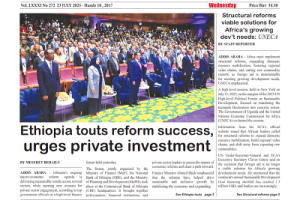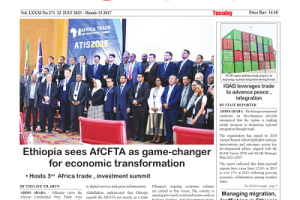
African leaders decided to establish a Continental Free Trade Area (AfCFTA) with the goal of creating one market across all the countries of the African Union. The formation of this institution has the objective of promising free movement of goods, services, investment, people, and cooperation. The AfCFTA is a development oriented organization that boosts intra-Africa trade and help reduce poverty across the continent when fully implemented.
Launched in 2019, the AfCFTA is to serve as a continental market with a population of 1.4 billion people with a combined GDP of approximately USD 3.4 trillion. When its goal is fully realized, with its mandate of eliminating trade barriers, it will be the largest free trade area in the world bringing together all the countries of the continent. Experts are of the opinion that the AfCFTA could be a major driver of the African integration agenda through its promotion of trade in the continent. As Africa has a low share in global trade, this has been attracting more attention.
As of Experts, Africa has been attracting those interested in sustainable development, climate change, and increased production for the future. It is on record that the continent has exported unprocessed and raw materials with little value added. These primary commodities have consisted of a large share of exports from a number of African countries.
A huge number of African households live on less than two Dollars a day. However, in a few African countries there has been a rise in incomes due to improved skills of African workers. However, in spite of these developments, Africa has faced unique challenges arising from various epidemics which made its people vulnerable to dependence on the developed countries for food and medical aid.
African leaders have tried to overcome the social and economic problems the continent had inherited from the colonial era. They have made decisions to integrate the African countries through various means, including free trade within the continent. This approach advances the economic progress and development that would raise the living standards of the African people.
One of the challenges Africans faced was the imbalance between demand for and supply of what they needed for their survival. This imbalance has led to domestic inflation which has been fueled by global inflation that flows into Ethiopia through unavoidable imports. These imports include fuel, medicine, machineries, raw materials used as inputs in the different sectors of the Ethiopian economy. These problems are shared by nearly all African countries that are involved in global trading.
The wars conducted in the various countries of the world have also pushed up the prices of staple foods, reduced their supply, and worsened an existing hunger crisis in parts of the African continent. Moreover, the successive and uninterrupted global crises of recent years have reduced the ability of African governments to focus on their development objectives, programs and projects. Experts have noted that across the African continent public debt has been rising and has become unsustainable. As borrowing costs have risen tremendously, repayment of the loan and interest has affected regional integration.
The African continent has been endowed with rich natural resources that may support and drive sustainable development through the accelerated industrialization and agricultural development. These sectors will also be sustained with modern services sector that facilitate sector integration within African countries. These developments attract foreign direct investment that would contribute to both the domestic and external market.
Domestically, they contribute to the production of goods and services, employment generation, and promotion of technical skills among domestic workers. Externally, they export goods and services that would generate foreign exchange which, in turn, is used for the import of inputs for the economic sectors in Africa.
Moreover, the industrialization process will be fully supported with minerals that are domestically available. Therefore, the resources of the continent are beneficial for both domestic and external investors who seek profit for their efforts. Also, the development of infrastructure in African countries, including Ethiopia, promotes trade within the region and at the global level.
Trade has been an engine of economic development focusing on resolving many challenges faced by Africa. But, the failure to apply appropriate trade policy has led to commodity dependence which caused structural instability, fiscal unpredictability, and bad governance.
Given that the current composition of African external trade is heavily skewed, the focus of the AfCFTA is on balancing the African export and import. Moreover, “intra-African trade” has to be enhanced by agreements with major trade growth and development projects focused on agricultural and industrial products.
Experts caution that the success of the AfCFTA should be properly replicated and thoroughly implemented in all countries. To enhance efficient trading, appropriate infrastructure and logistics to move products as well as the regulatory environment are essential. Some member countries, including Ethiopia, have made joint efforts for the development effective and efficient trading mechanism.
Another critical success of the AfCFTA is the legal movement of people from one country to another. The African Union introduced a Free Movement of Persons Protocol in 2018 which has been signed by 32 countries and only four have ratified it. ECA research has pointed out a lack of information and knowledge on the benefits of the free movement of people. It also mentioned the weak political will to encourage free movement of labor in search of jobs.
There are, however, conflicting interests related to the hesitancy of movement of people, including political, social and economic factors. However, labor experts believe that the spill-over effects of the free-movement of people across Africa is economically beneficial. The ECA has confirmed that informal cross-border trade has immense economic benefits which are valued as a certain proportion of the all formal intra-African trade flows. Both the formal and informal trading between African countries contributes to the generation of employment and income to the people of the continent. Editor’s Note: The views entertained in this article do not necessarily reflect the stance of The Ethiopian Herald
BY GETACHEW MINAS
THE ETHIOPIAN HERALD WEDNESDAY 12 FEBRUARY 2025





